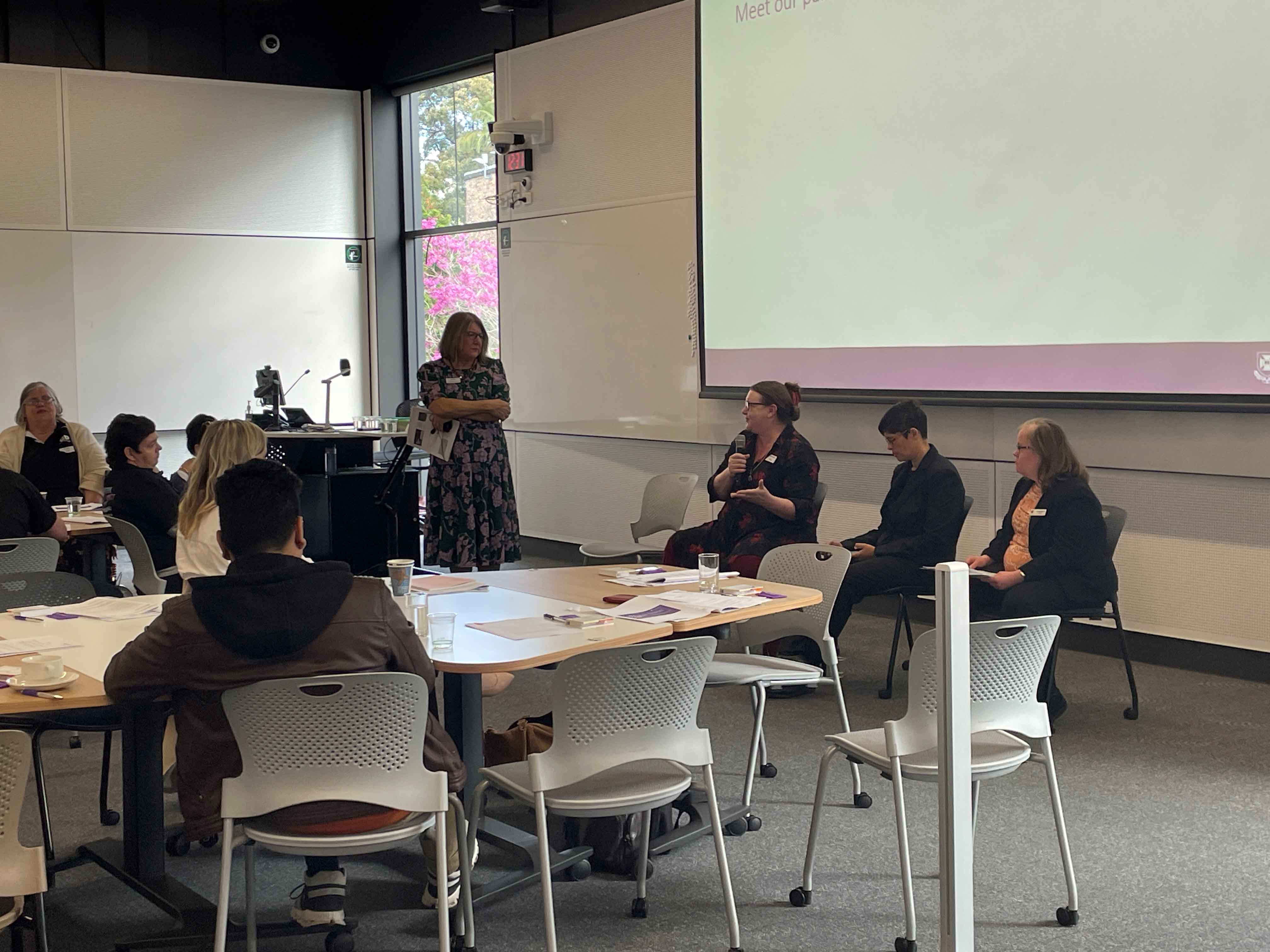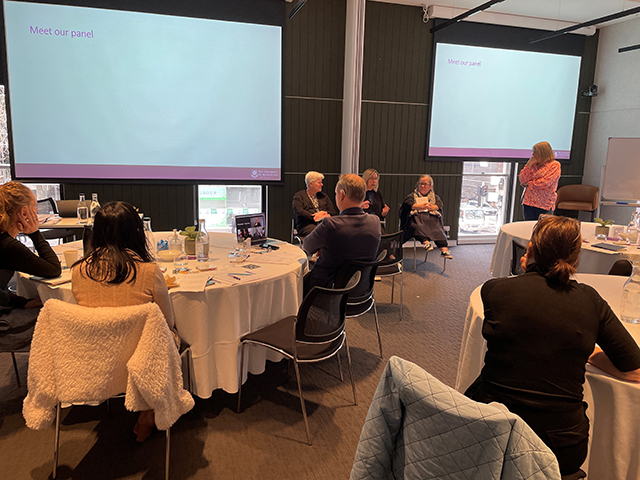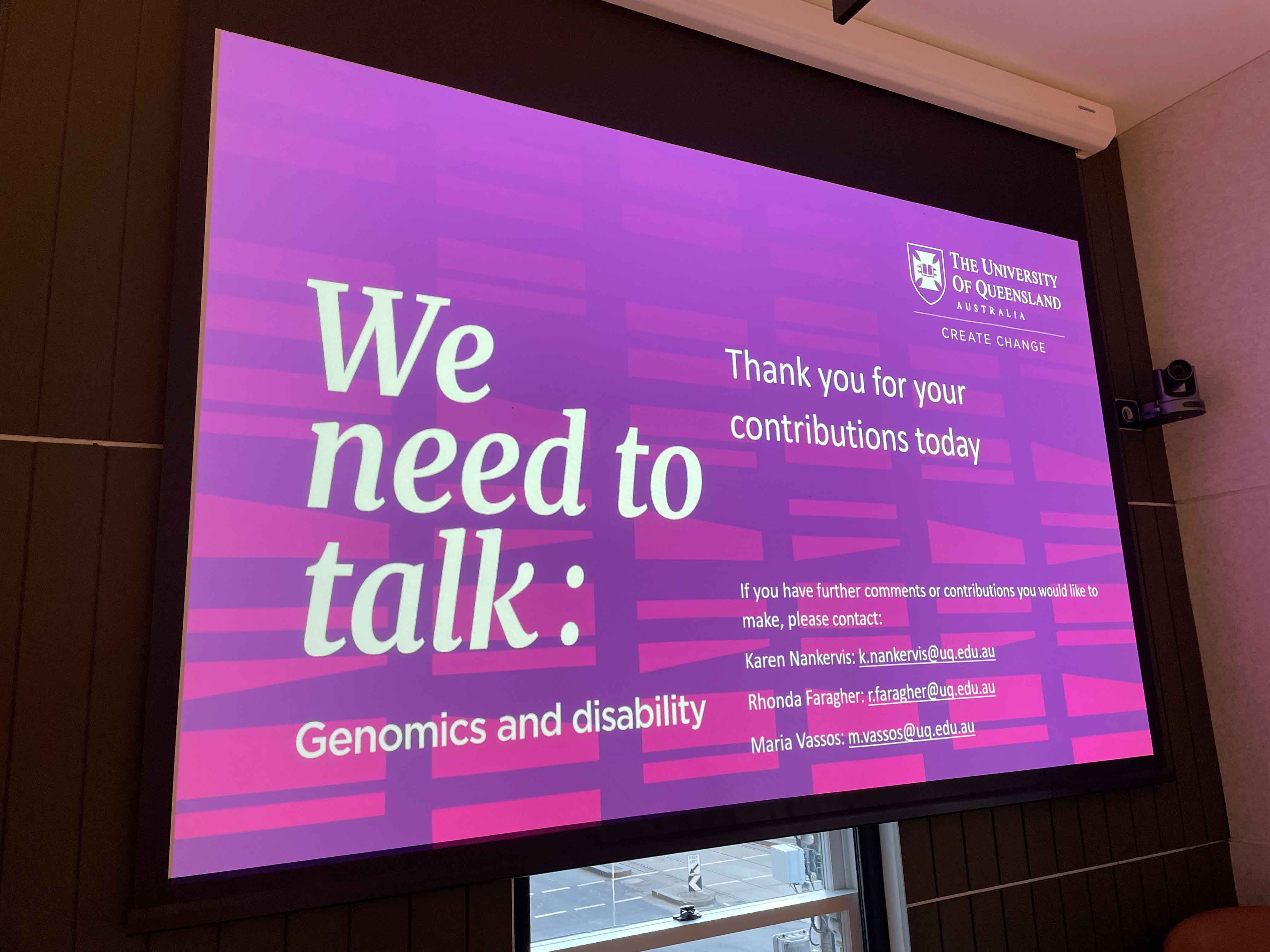Evidence Review
A scoping review of the existing evidence base has been completed in relation to the ethical, legal and social issues and implications (ELSI) of genomic technologies for people who identify as having a lived experience of disability.
Access a short summary of this scoping review.
Access an Easy Read summary of this scoping review.
Read an open-access journal article reporting the findings of the scoping review from a human rights perspective. This article was published in Advances in Neurodevelopmental Disorders.
Genetic Counsellor Survey
Between November 2021 and March 2022, members of the “We Need to Talk” research team disseminated an anonymous survey to genetic counsellors that aimed to evaluate their attitudes towards disability and prenatal testing.
Participants were recruited through the Human Genetics Society of Australasia, and via social media advertisements posted by the investigators on X (formally Twitter) and other social media platforms. A sample of 106 genetic counsellors (including students undertaking study in genetic counselling) provided valid survey responses for data analysis.
Some of the key findings were:
- Genetic counsellors report being more comfortable interacting with people with physical disability compared to intellectual disability. Participants commented that their discomfort was not reflective of bias towards people with intellectual disability; it reflected their inexperience and an apprehension about communicating disrespectfully.
- Most genetic counsellors viewed prenatal testing for disabilities positively as it gives expectant parents information to support decision making around pregnancy termination and/or information to support the expectant parents to prepare for raising a child with disability.
- Genetic counsellors responded that one’s personal beliefs and experiences with disability was the primary factor influencing parental decisions to terminate a pregnancy affected by disability.
- Some of the challenges identified for prenatal genetic counselling by the sample included the impact of negative societal attitudes towards disability and the low visibility of disability on parental decision making.
The findings from the survey highlight important education and training needs for genetic counsellors to improve preparedness and comfort when interacting and communicating with people with disability.
The findings from this study have been published in the Journal of Genetic Counselling (open access).
Large Scale Survey
Between March and June 2023, members of the “We Need to Talk” research team disseminated an anonymous survey about the ethical, legal, and social implications of genomic technologies for people with disability. This survey was informed by the Evidence Review.
The team aimed to sample people with lived experience of disability; parents and family members of people with disability, genomics researchers, people employed in the disability sector and member of the general public to complete the survey. Several people with intellectual and cognitive disabilities also took part by expressing their views via an interview with a member of the research team as opposed to completing the survey.
Participants were recruited through social media advertisements disseminated by disability and genomics peak bodies across Australia, and a targeted participant recruitment process through an Australian market research provider (Pureprofile). A total of 875 participants completed the survey.
Short, animated information videos on key genomics concepts were also included in the survey to assist the participants with survey completion.
Some preliminary findings:
- Participants were generally supportive of the use of genomic technologies like prenatal testing, gene therapy, and gene editing (if, and when its viable for human use), and the population having access to these technologies at no or low cost.
- Participants weren’t supportive of limits being placed on what genetic conditions are subject to the use of genomic technologies (e.g., limiting use to conditions that limit lifespan to the first few years of a person’s life).
- Participants also indicated that the perceived aim of genomic technologies (i.e., the prevention of people with disability being born) has social implications for existing people with disability including stigmatisation and devaluation.
- Between-group differences were noted, with genomic researchers highlighting the benefits of genomics technologies more (e.g., choice around parenting a child with disability, more time to prepare for parenting a child with disability), and people with disabilities, their parents and their families highlighting negative social implications more.
- Participants who report more religious guidance in their life tended to have more conservative views regarding the use of genomic technologies.
The research team is currently collating the findings from the survey, and summary findings in multiple and accessible formats will be added to this page soon.
Delphi Study
Between September 2022 and June 2023, members of the "We Need to Talk" research team conducted a Delphi study to gather a deeper understanding of some of the ethical, legal, and social implications of genomic technologies for people with disability identified via the Evidence Review.
A Delphi study identifies a set of experts to respond to a series of surveys across several rounds of data collection, with the aim being to find a consensus view on a particular topic. The Delphi study for the “We Need to Talk” project involved 18 participants identified as ‘experts’ by the research team, which included people with lived experience of disability, parents of people with disability, genomics health professionals, genomics educators, and genomics researchers.
In Round 1, the participants completed an online survey that contained 21 rating scale questions. In Round 2, the participants responded to another online survey which contained 11 rating scale questions. These questions aimed to gather more insights into some of the ethical, legal, and social implications where a consensus view was not reached in Round 1. Participants were able to provide a written or audio responses to elaborate on their rating scale responses.
Some of the views where consensus was reached across the participants include:
- People with disabilities should be active participants in discussions about the appropriate use of genomic technologies in research and practice.
- People with disabilities should be fully supported by society to live their best lives, whether or not genomic technologies exist that could prevent genetic disabilities.
- Improved disability awareness and social inclusion will protect people from the potential negative impacts of genomic technologies, such as feeling devalued or stigmatised.
- Access to genomic tests should be equitable.
- Prior to genomic testing, individuals should be provided with accessible information about what the test results might mean for them.
The research team is currently collating the findings from the Delphi study, and summary findings in multiple and accessible formats will be added to this page soon.
National Roundtables

In July 2023, the “We Need to Talk” project conducted two Roundtables (one in Brisbane and one in Melbourne) to enable a deeper in-person exploration of the ethical, legal, and social implications of genomic technologies for people with disability. The aim of the Roundtables was to capture the variety of perspectives and experiences of multiple stakeholders when it comes to the topic of genomics and disability.
This final stage of the “We Need to Talk” project brought together 51 participants from multiple stakeholder groups including people with a lived experience of disability, family members of people with disability, genomics and other health professionals, genomics researchers, and other stakeholders who have a personal and/or professional interest in disability and/or genomic technologies.
The agenda for the Roundtables consisted of a presentation of preliminary findings from the “We Need to Talk” project, information videos about genomic technologies, human rights, and bioethics; a panel discussion with several experts, and group discussions to discuss topics and issues of relevance.

The information videos presented at the Roundtables are now available online to watch.
Some preliminary findings:
- Participants highlighted that people with disability add value to a diverse society, and their inclusion in society is important, not their removal.
- Participants noted that ableist attitudes (where people with disability are assumed to be incapable) are a social barrier to inclusion and participation, especially in relation to genomic research and policy.
- Participants stated that personal decision making following prenatal screening/testing results should be informed by more than just medical facts, and the decisions made by expectant parents needs to be respected.
- Participants cited that health professionals have minimal training in disability and working alongside people with disability and this can impact the advice they provide to genomic testing consumers (e.g., may express outdated views regarding people with disability).
- Participants with lived experience of disability clearly stated that they want to be part of the genomics research agenda moving forward.
Summary findings from the Roundtables in multiple and accessible formats will be added to this page soon.

